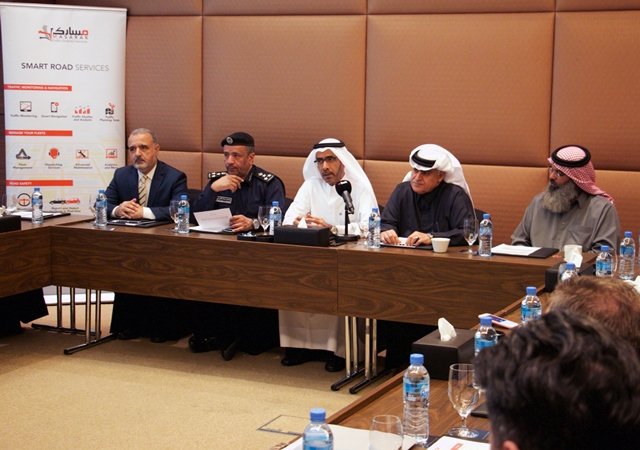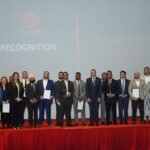Doha
22 Feb. 2017
2016 Annual Qatar Traffic Report revealed today that Traffic congestion during 2015 in Qatar has an economic impact of QAR 5.6 to 6.6 billion.
Using its advanced traveler info system (MasarakTM) and utilizing its unique and rich bank of traffic data in Qatar, the Qatar Mobility Innovations Center (QMIC) launched its 2nd annual Qatar Traffic Report (QTR) for year 2016 at the Hilton Hotel in West Bay. The event was attended by key national partners, and local media organizations.
The 2016 QTR provides unique insights about traffic congestion and movement in Qatar throughout the year, across the main road segments and during different times of the day. More importantly, this year report provides interesting comparisons with the status and economic impact of traffic congestion in the prior year of 2015.
The key findings and the detailed analytics provided by the QTR can be of significant value to national entities and private enterprises in Qatar especially the ones who are active in the areas of transportation, road safety, smart cities, and urban planning. Examples of important use cases where the QTR can be of great service may include areas such as: assessing the impact of road/infrastructure projects on traffic over time; Monitoring changes in congestion levels across Qatar; Identifying problematic congestion areas in specific times/days; Quantifying the economic and environmental impact of road congestion; and comparing the traffic trends from year to year now that we have two-years’ worth of history on that.
On the release of the 2nd edition of the QTR report, Dr. Adnan Abu-Dayya, the Executive Director and CEO of QMIC commented by saying “We are pleased to release the 2016 QTR that provides the only comprehensive, scientific and data-centric update about the status of traffic congestion in Qatar. We are equally pleased that after many years of hard work, QMIC has developed and deployed the only advanced traveler info system in Qatar with a comprehensive state of the art data collection network combined with necessary intelligence and user applications.
Dr. Abu-dayya told " We strongly believe that Masarak represents a key enabler for major ITS, smart city, and road safety projects in Qatar. We urge national entities and private enterprises to make full use of it and to work with us on evolving it to make sure it continues to meet their expanding needs and requirements and to support our vision of creating a thriving local industry in this important domain.”
QTR takes into consideration a number of key globally accepted metrics to report on the severity, time, and locations of traffic congestion in Qatar. In order to gauge traffic conditions for year 2016 in a scientific, methodical and accurate way, the QTR uses the concept of Masarak Congestion Index (indicates average reduction in speed due to congestion) and the Travel Time Index (indicates the increase in travel time due to congestion) to assess the level of road congestion.
Based on analyzing more than 1.4 Billion data records collected by the Masarak advanced traveler info system across the major road segments in Qatar, some of the key findings revealed in the 2016 QTR include:
• The average number of extra hours spent due to congestion is 109 hours per commuter in 2016 (this is slightly higher than the 102 hours in 2015)
• The economic cost (lost productivity) of congestion in 2016 is estimated to be between 5.6 and 6.6 billion QR (compared to about 5.2-6.0 billion QR in 2015). This translates to a loss of about 0.9-1.0% of the GDP in 2016
• Although the overall congestion for 2016 is slightly worse than 2015, congestion levels in the 2nd half of 2016 are better than those of 2015. This indicates that road projects completed by Ashghal in the middle of 2016 started to have a positive impact on traffic flow
• We expect traffic behavior to keep improving or stay flat on a year-year basis as more road projects are completed
• Congestion behavior started to spread more geographically due to urban expansion
• Oct. 2016 was the most congested month in the year with a travel time index of 1.75 throughout the day.
• The highest congestion period is the morning peak (around 7 am) where the average congestion index is 36%
• In the morning peak hours of work days, Sundays had the highest travel time index of 2.14 and Thursdays had the lowest travel time index of 1.97 QMIC’s QTR has been considered as a traffic index (and a score card) for Qatar over a period of 2 years so far.
Having a traffic index for a country or a region resonates globally and is considered highly desirable and needed to measure and calibrate the road network, to set the right traffic policies and procedures, and to improve urban planning to ensure smoother traffic movement while taking into consideration the ongoing population growth and major infrastructure projects in the country.
The QTR is one of the key outputs of the Masarak System which was fully developed and deployed by QMIC. Masarak represents a comprehensive platform and integrated suite of services serving the areas of Intelligent Transport, Road Safety, and Smart Logistics/Telematics.
In addition to its analytics platform, proprietary technology, and GIS layers, Masarak has its own sophisticated multi-source data collection network consisting of: a large fixed sensing network using QMIC’s WaveTraf Bluetooth traffic road sensors, thousands of Telematics devices installed in fleet vehicles, and crowd-sourced data being contributed by thousands of iTraffic mobile application users.
Having these sources of traffic data has given QMIC the ability to compile the most and only comprehensive bank of traffic and mobility data in Qatar based on collecting hundreds of millions of speed records across the Qatar road network in the last few years.








